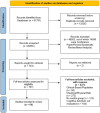The effects of work on cognitive functions: a systematic review
- PMID: 38784613
- PMCID: PMC11112082
- DOI: 10.3389/fpsyg.2024.1351625
The effects of work on cognitive functions: a systematic review
Abstract
Introduction: Cognitive functions play a crucial role in individual's life since they represent the mental abilities necessary to perform any activity. During working life, having healthy cognitive functioning is essential for the proper performance of work, but it is especially crucial for preserving cognitive abilities and thus ensuring healthy cognitive aging after retirement. The aim of this paper was to systematically review the scientific literature related to the effects of work on cognitive functions to assess which work-related factors most adversely affect them.
Method: We queried the PubMed and Scopus electronic databases, in February 2023, according to the PRISMA guidelines (PROSPERO ID number = CRD42023439172), and articles were included if they met all the inclusion criteria and survived a quality assessment. From an initial pool of 61,781 papers, we retained a final sample of 64 articles, which were divided into 5 categories based on work-related factors: shift work (n = 39), sedentary work (n = 7), occupational stress (n = 12), prolonged working hours (n = 3), and expertise (n = 3).
Results: The results showed that shift work, occupational stress, and, probably, prolonged working hours have detrimental effects on cognitive functioning; instead, results related to sedentary work and expertise on cognitive functions are inconclusive and extremely miscellaneous.
Discussion: Therefore, workplace health and well-being promotion should consider reducing or rescheduling night shift, the creation of less demanding and more resourceful work environments and the use of micro-breaks to preserve workers' cognitive functioning both before and after retirement.
Systematic review registration: https://www.crd.york.ac.uk/prospero/display_record.php?ID=CRD42023439172, identifier CRD42023439172.
Keywords: aging workforce; cognitive functions; cognitive impairment; occupational stress; sedentary work; shift work.
Copyright © 2024 Bufano, Di Tecco, Fattori, Barnini, Comotti, Ciocan, Ferrari, Mastorci, Laurino and Bonzini.
Conflict of interest statement
The authors declare that the research was conducted in the absence of any commercial or financial relationships that could be construed as a potential conflict of interest.
References
-
- Abdelhamid B. M., Omar H., Hassan M. M., Embaby S. A., Rady A., Mohamed Aly H. (2020). Effects of partial sleep deprivation following night shift on cognitive functions of Egyptian anesthesiologists; prospective observational study. Egypt. J. Anaesth. 36, 61–68. doi: 10.1080/11101849.2020.1768630 - DOI
-
- Adams T. P., Venter S. (2020). All night long: An assessment of the cognitive effects of night shift work in anaesthesiology trainees. South. Afr. J. Anaesth. Analg. 26, 287–292. doi: 10.36303/SAJAA.2020.26.6.2361 - DOI
Publication types
LinkOut - more resources
Full Text Sources
Miscellaneous


